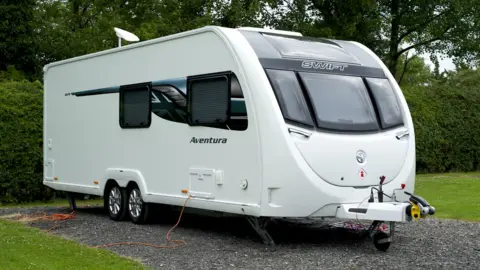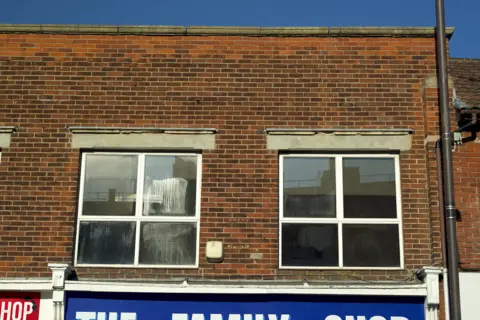Children in care are being illegally placed in caravans and boats
 BBC
BBCChildren in care are still being illegally placed in unregulated homes in England, including on narrowboats and in caravans, BBC News has learned.
We found a 12-year-old boy was placed at a campsite for weeks, more than 100 miles from his siblings and school.
Such placements were banned for under-16s, but there are concerns exemptions for holidays are being exploited.
The Department for Education says it is Ofsted's job to prosecute companies running unlawful children's homes.
Narrowboats and caravans
Local authorities are breaking the law by placing children under the age of 16 in unregulated homes.
It is also illegal for companies to run unregistered children's homes, although there are exemptions allowing firms to run placements that are not regulated, such as for holidays or leisure activities.
A BBC News investigation has found such placements are being widely used. We found at least 120 children, including one child aged 10, had been placed in unregulated homes.
Ofsted says these are not meant to allow the child to be moved between temporary placements, but there is no law or guidance defining these activities. Tents have previously been used by other companies.

The 12-year-old boy was recently placed in unregulated care for at least six weeks with a company that moves children between its narrowboats and caravans.
Despite being under the care of Worcestershire County Council, he was placed in a caravan on a campsite, in Lancashire, more than 100 miles away from his siblings and his school.
The boy had been moved between a number of children's homes before his most recent home was closed at short notice for staffing reasons. He was then moved into a caravan run by Bear Care Services. In contrast, his brother has been in a stable foster placement for years.
When contacted by the BBC, the company said the placement was needed because of a "massive shortage of registered provision". It said it was operating lawfully because placements in mobile homes, such as caravans and narrowboats, do not need to be registered.
However, Worcestershire County Council did not deny it was breaking the law in placing the child in an unregulated setting. It described the accommodation as a "crisis" placement, despite the length of his stay. The government said there was no such thing in law.
The BBC has also learned of another case where a 14-year-old known to be at risk of jumping out of windows was placed without safeguards in an unregulated home above a shop.
'National scandal'
In total, the BBC received responses from 141 local authorities in England to Freedom of Information requests. More than 50 admitted placing at least 120 children in unregulated homes.
Many refused to provide the real number of children placed in unregulated homes because they said the data was the personal information of the child.
Some placements include restrictions on the movements and freedoms of children for their own welfare, which are occasionally granted by a High Court judge when there is no suitable accommodation available. This means highly vulnerable children are placed in homes with the least scrutiny of standards.
Katharine Sacks-Jones, chief executive of Become, a charity for children in care, said the situation was "a national scandal".
"It's just tragic to hear that you've discovered so many children who are being placed in settings which are unsuitable for them", she added.
Carolyne Willow, director of the children's charity, Article 39, added: "A young child moving from caravan to caravan defies understanding of what a holiday is.
"The government needs to amend the legislation to make it absolutely clear what constitutes holiday accommodation for children in care."
In 2019, BBC News revealed that an 11-year-old had been placed in unregulated care, and found that older children faced organised abuse in homes.
When the government announced its ban, Secretary of State for Education Gavin Williamson said: "The BBC highlighted something that just needed to be changed."
But while placing under-16s in an unregulated home is now unlawful, no legal action has been taken against any council.
The Department for Education declined to answer whether it had failed to properly legislate against the use of unregulated placements.
In a statement, it said: "Ofsted can prosecute providers operating as children's homes without the required registration and it holds local councils to account for the quality of care and accommodation they provide to vulnerable children", it added.
But BBC News has learned that Ofsted has not brought any prosecutions against companies for running an unregistered children's home. Ofsted says it has not been provided with additional powers it was promised, such as the ability to fine providers directly.
It said that local authorities faced "significant challenges" in finding the right homes.

Have you had an experience of unregulated homes? You can share your story by emailing [email protected].
Please include a contact number if you are willing to speak to a BBC journalist. You can also get in touch in the following ways:
- WhatsApp: +44 7756 165803
- Tweet: @BBC_HaveYourSay
- Upload your pictures/video here
- Or fill out the form below
- Please read our terms & conditions and privacy policy
If you are reading this page and can't see the form you will need to visit the mobile version of the BBC website to submit your question or comment or you can email us at [email protected]. Please include your name, age and location with any submission.

